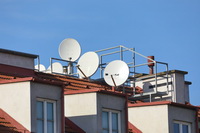Installation of certain communications equipment on leased property to enable expansion of wireless networks should not be allowed without owner consent. That is the message submitted on June 3 to the Federal Communications Commission (FCC) by an industry coalition that includes The Real Estate Roundtable. (Joint Industry Comments to FCC).
 |
The installation of certain communications equipment on leased property to enable expansion of wireless networks should not be allowed without owner consent. (Joint Industry Comments to FCC, June 3) |
- The coalition's comments come as the FCC considers whether to expand its interpretation of federal law regarding consumer home antennas, spurred by the development of 5G technology for the next generation of advanced communications equipment.
- Current FCC rules allow residential and commercial tenants to install in leased spaces certain types of "customer-end" antennas and satellite dishes known as Over-the-Air-Reception Devices ("OTARD"). The current scope of the OTARD rules is designed to enable consumer choice for tenants to select the kinds of cable and broadband services they desire.
- The FCC's Notice of Proposed Rulemaking (announced on March 22) suggests a regulatory expansion outside the existing scope of "customer-end" devices in leased residential apartments and indoor office spaces. The agency's proposal would confer a broad grant of rights on broadband providers to access rooftops and other common areas – without the building owner's consent – for the dense deployment of "hub and relay" antennas and other fixed wireless devices attendant to 5G infrastructure.
- The real estate coalition believes new FCC rules are not necessary because apartment residents, commercial tenants, and other customers demand fast and reliable Internet service in the 21st century marketplace. "[C]ompetitiveness … has driven property owners to ensure that broadband infrastructure is available in their communities and other buildings," the industry's comments state. "This deployment has taken place without government mandates, and the Real Estate Associations strongly believe that government intervention is not needed."
 |
The Real Estate Associations' opposition to the Over-the-Air-Reception Devices ("OTARD") rule's expansion is detailed in expansive comments. |
- According to the coalition, property owners have invested in excess of half a billion dollars over the past decade – a low-ball estimate – of their own capital to deploy broadband infrastructure in their assets. Additionally, a basic exercise of building management is to enter into mutually beneficial arrangements with broadband providers to provide tenants with Internet access. Government intervention – and regulation of rooftops and other building spaces – is not necessary because the market is already functioning and thriving.
- The real estate groups' comments acknowledged that broadband deployment in the nation's rural areas (81.7 percent coverage) lags considerably behind urban coverage (99 percent). Strides need to be made to "close the gap between urban and rural deployment. But we also think it is important to note that existing rates of deployment were achieved with cooperation of the real estate industry," the groups explained to the FCC.
The Real Estate Associations' opposition to the OTARD rule's expansion is detailed in its expansive comments. For more information, see the National Multifamily Housing Council's resources on telecommunications issues.

